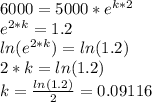Answer:
There will be approximately 17915 bacteria after 14 hours.
Explanation:
Assuming that the bacteria are growing at a exponential rate expressed by the formula:

Where 5000 is the initial number of bacteria and t is the time elapsed in hours, we first need to find the value of k. This is done by applying a known point to the function, which would be 2 hours after the start in this case.

We can now predict the number of bacteria after 14 hours as shown below:

There will be approximately 17915 bacteria after 14 hours.